All branches of the UK Armed Forces are on average 6% below the target strength set out in the 2015 Strategic Defence and Security Review.
A House of Commons library research briefing published today, titled ‘UK Defence Personnel Statistics‘, provides details on how UK military service personnel statistics are measured and discusses current and historic strength levels.
“As at 1 January 2021 all branches of the UK Armed Forces were below the 2015 SDSR target for 2020. The full-time trained strength of the UK Armed Forces was 135,444 which is a shortfall of 8,756 (6%). The Army had the largest proportional shortfall (7%) and the Royal Navy/Royal Marines the smallest (4%).
On the 1 January 2021 the required size of trained UK armed forces personnel (those who have completed both phase 1 and 2 of training) was 144,676. The actual size however, as noted above, was 135,444 – a shortfall of 6.4%.”
The House of Commons briefing paper also, interestingly, states:
“Based on media reports, it is expected that the MoD’s Integrated Review (to be published on 16 March) will suggest a reduction of 12,500 personnel from the Army to size of around 70,000. There is speculation that instead of a redundancy programme (as in the early 2010s), there will be fewer people recruited to replace natural wastage of those leaving the Army each year.”
Phase 1 and 2 of training?
The document explains that ‘trained strength’ comprises military personnel who have completed Phase 1 and Phase 2 training:
- Phase 1Â includes all new entry training to provide basic military skills.
- Phase 2Â includes initial individual specialisation, sub-specialisation and technical training following Phase 1 prior to joining the (trade) trained strength.
You can read more here or download the full report, including the tables and graphs, here.



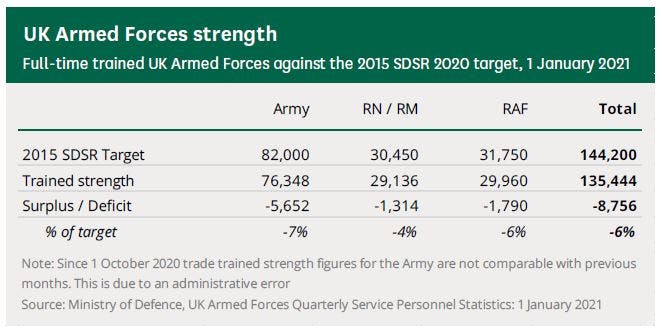
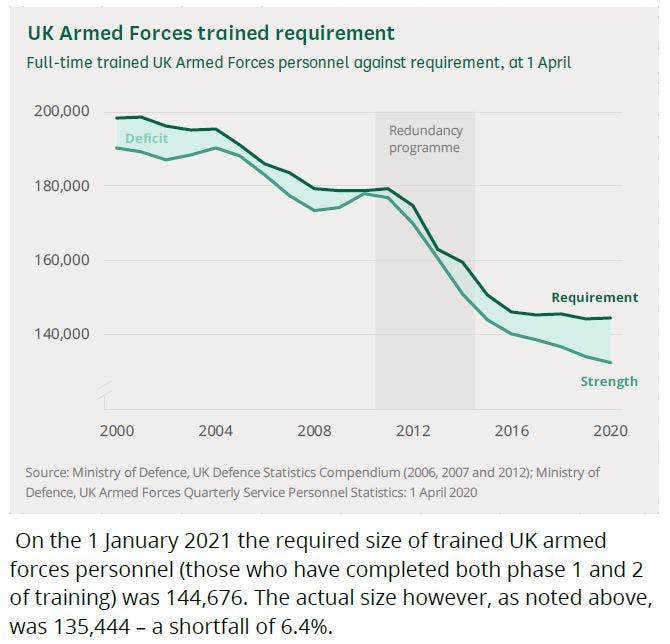

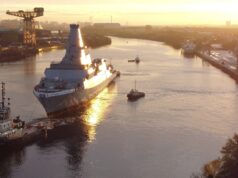
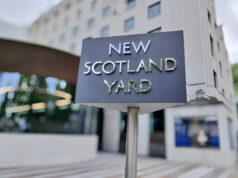

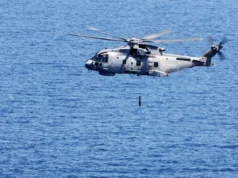
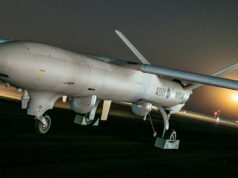
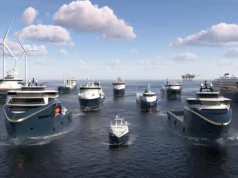

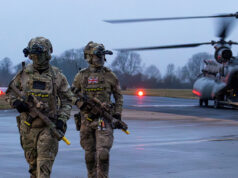
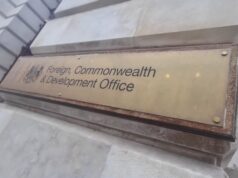

Given the poor conditions including some awful housing, the pay in many sectors and the insecurity of looking over the shoulder for the defence review i’m not surprised.
I would add that there is not much active service happening at the moment. People join the army ‘to soldier’ not to shove a swab into a civvies mouth in a windswept car park.
Maybe this is the time to speed up autonomous functions as well as recruiting more specialised personnel?
Autonomous functions are perhaps a way to widen the skill base of those remaining and the salaries will need to reflect that. In the 1980s they said that computers would put millions of people out of work but in reality it creating millions of more lucrative and more interesting jobs. I wouldn’t be surprised to see six figure salaries for the forces at the sharp end!
When I joined the army in 1975 they had only recently phased out extra pay for having a degree. Some in specialist Corps did/do get extra pay – but not me as a REME officer – but it was far from six figures!
Graham six figures in 1975 would have been a small fortune.
I suspect the plan might evolve into a higher starting salary for less people. Once trained (as now) your value will be in your ability to operate / maintain a certain piece of kit or undertake a specific operation.
However this may mean fewer people are able to unleash more and more fire power however the people needed require more and more skill. A skill which few might have.
These are fertile grounds for the forces to pay top dollar to keep the few whilst they are needed.
In 1975 you would have need a lot of people working together to unleash the firepower you had. Now the numbers are getting fewer by the the day and it is becoming more specialised.
graham you have my full respect for joining the army and serving the country its a shame not many young people care about it as much as the older generation.
I wonder whether the arbitrary targets for ethnic minority and female recruitment are contributing to the shortfall. Are otherwise acceptable candidates being turned down so these targets can be met?
No there not.
Hope you are right – the forces need every decent candidate they can get.
Then it has a lot of work to do.
I spotted a diplodocus today
I hope you are correct in saying that.
Managed to squeeze the old prejudices into the topic again I see!
Not at all. Just read the full report which details the diversity targets. I do know some police forces have had difficulty meeting similar targets in the past.
The targets are not arbitrary, they are designed to ensure that the armed forces truly represent the whole population of the United Kingdom – this is important for their credibiliy and national defence. The armed forces have done this for hundreds of years by recruiting regional regiments and associating ships amd squadrons with towns and cities, so its nothing new.
Well, I guess the way to meet the 2015 SDSR is to lower the target for the latest review! Problem solved…hey presto!
but that really isn’t gonna make us stronger just make us feel better because we now we reached out target.
Hi folks hope all is well.
It’s not surprising given the lack of good PR for our armned forces, and possibly the living conditions. However, given the recent press about proposed cuts, this will have a negative impact.
On a slightly different aspect. Hopefully some of you experts can advise.
I’m finding it difficult to counter debates when people and indeed friends say the UK military is finished. Although I do actually point out all the positive matters and list off new advances equipment etc, the professionalism and quality.
However, it’s still difficult to argue against cynical comments, any advice would be welcome.
Cheers
George A
The fact that cuts have continued for over 40 years to equipment and personnel presents a massive image problem. Whilst funding has always been the underlying issue, I think the lack of a clear and coherent plan for what we want the forces to do must also have a negative impact. Every strategic review ends up being another cutting exercise. The long lead times for new kit, which always costs far more than what it replaces, means quick radical change is all but impossible. If the current review is to be more than another round of cuts, it must set out the strategic vision and link it to the detailed decisions. Empty phrases like global Britain simply aren’t good enough. Overall increases in numbers are probably unaffordable but a clearer direction and a promise of no more cuts might help to attract and retain the people we need.
We will know very soon if this has been achieved.
Sorry but I pressed post before I had finished. Institutional memory( tradition) is long and powerful. People remember the era when Britain was a truly global power. This leads to unrealistic expectations of what a country of our size and resources should try to do. Focus on what we really need to do and making sure we have the capabilities to achieve that is absolutely key. Difficult but essential.
I wonder why such people say the UK military is finished? We are about the top 5th or 6th spending nations on Defence, our armed forces have long been recognised as extremely well trained, well disciplined and experienced.
Mostly our deployments have been successful and other nations, such as the US consider us to be very close and good allies. Our SF is probably the best in the world and other elites are highly regarded (RM, Paras). Much of our equipment in-service or soon to arrive is state of the art – the QE-class carriers, Astute submarines, Type 45 destroyers, the latest MCMVs, Ajax and Boxer (hopefully both will succeed), F-35B – and so on.
Some argue that we had limited success in Afghanistan and Iraq – our forces were understrength and initially the land equipment was not optimised for the role or environment – perhaps we accept some criticism.
Recruiting is weak, with all services under-strength – much blame is rightly put on Capita but the appeal of a military career has lessened due to reduced chances to deploy on active service, perceived poor pay and living conditions, over-harsh discipline for the ‘snowflake’ generation etc. Also retention is probably to blame as well for understrength units.
On the up-side a military career has more variety than before, fair promotion prospects and a reasonable pension downstream.
all good and that. but the army is in a horrendous state. the challengers are outdated. the type 45 destroyers we only have 6 of and the personal number is all time low. and the rising tension in the south china sea and Russia leads many people to believe if Britain went into another war we would be finished.
Before I became a big fat hairy civy, I was part of the Royal Military Academy Sandhurst (RMAS) officer recruiting team Whilst the issue of recruiting has been a huge problem since the 80s , the situation was really turned on its head when the recruiting arm of the armed forces was privatised. There was a lot of complaints about Capita and in answer to that we were all hit with a three line whip to attend a meeting at Churchill Hall, Lecture Theatre at RMAS. After being bored crap less by the so called plan of action complete with Microsoft Power point slides given I should add by the just departed British Army and now head of Captia recruiting head honcho the floor was given over to the audience…Huge mistake with full Cols expressing their anger at just how bad Captia was and that what they were doing wasn’t working
(For example, I had a young lady who wanted the join as an Officer, at University , and after trying to apply via the Internet enrolment system which Captia brought in as the first part of joining up, she was refused, she appealed and got a face to face meeting and was told that the reason she had failed was that she had broken her leg as a child and the ‘computer’ said that her leg wasn’t good enough to undertake basic training. In reply she stated that that injury transpired as a young child, that as a teenager she represented the county at cross-country and that due to her been rejected, she had joined the TA (Passed her training flying colours) and through them had joined the University Officer training Corp. At this Captia took a backtrack, asked the advice of a doctor (without seeing the candidate in question) who stated that if she kept a daily diary of her training for a year, and she had no physical issues she could apply again…she walked. I had another young lady refused because she stated on her online application form that she had suffered from acne, the irony here was she was stunning to look at without a blemish on her face.)
Anyway after the stage was hit with a full broadside , the head of the meeting took to the stage and stated quite forcefully that we would make it work. The problem was Captia wasn’t up to the job. In order to try and cultivate a few links, I organised a visit to Upavon (on the premise of just to have a look and to become familiar with the recruiting business) and was shocked at the state of affairs during out coffee with the bloke who ran the show, I was shocked to find he had actually worked as an electrical sales man at a huge store before applying for the job here. He let slip he had no prior knowledge of the military whilst I was there, I couldn’t help but notice that over 100 military personnel had been loaned to Captia to help their civilian staff manage with the military side of things.
My point, getting rid of a large number recruiting offices was a huge mistake because it took away a human face that people need when wanting to do something which will change their life for ever. A face that can answer questions, give advice and encourage those who just need that little bit of help.
Not a faceless computer interface which will hit you with “Computer says no†when you type in you had acne as a teenager.
If the recruitment process takes 6 months, many would have given up and found other jobs or apprenticeships. Twice as long as the old system of recruiting offices. I would like them to say how much money Capita has saved the armed forces!
Suspect that the majority of gaps are at the bottom end so less indian’s, As a bottom fed organisation its easier to fill ‘up’ so the scrotes at the bottom end up having a disproportionate amount of ‘gapped billets’. As these tend to be the young, they vote with their feet and leave, rinse and repeat….
Seems an excess of Generals and Admirals at the top that could be culled as this would reflect the ratio of “Scrotes” who you find so offensive at the bottom!
You’re well wide of the mark with that one Peter, sorry for triggering you with the term ‘scrote’. I was a proud scrote and lucky enough to be in the position to be able to tell an admiral that was giving us a ‘pep talk’ about the last set of redundancies that us scrotes had already been cut and perhaps it was the admirals and commodores turn… I was able to furnish numbers as it was a subject close to my heart.
I was a scrote too 🙂
Hi Guys soon be the 16 ,finding it hard to expect cuts but all UK PMs have done this for 30 years .Think I would be use to it by now.
Boris makes the liberals look pro military. lol
Having been a soldier in the 90’s, I never felt that I was in danger of losing my job but…… if I was in the Army now I wouldn’t be 100% sure that I would have a long career.
It is things like this, as well as not very good pay etc. You also have people that want to gain skills in the forces but aren’t that keen on being deployed on operations, I knew quite a few people like this but never understood why they joined up in the first place if they didn’t want to do these tasks….
I think that our long term commitment to ISAF operations in Afghanistan and others in the Middle East put a lot of people off because the casualty rates were fairly high.
The last thing I think is modern society in Great Britain, the limp wristed lefties and the people who teach our children in schools almost brainwash youngsters into being anti military, anti British and not patriotic at all….. as well as teaching them to be pacifists. This will have a bit impact on numbers wanting to join the military.
In the US, their culture is totally different and a lot of youngsters want to join the military as young men, in particular, are more aggressive in nature and American people are more patriotic so, serving their Country means more to them. Look at the huge influx of people joining the US Military after 9/11 as an example, they were swamped by new recruits in all branches of their armed forces. I couldn’t see that happening here.
Something needs to be done or it’s going to get worse as the left spreads it’s vile tentacles into more of our society.
Well said mate
as part of the younger generation am absolutely degusted at the behaviour of my generation towards the country. we may have been affected by a diseases that stopped us from seeing our friends and other stupid stuff but the generation before us had to face a mad man trying to Wipeout Jews and literary anyone who wasn’t blue eyes and blonde hair. and the generation after that had to face the threat of nuclear annihilation. We have become too soft!
The issue with turning off or dialing down recruiting is that in years to come the shortfall will appear at the NCO Senior Rate level. The RN has only recently worked its way through the last Black Hole which resulted from stopping recruiting as a cost saving measure the last time.
The RN ended up with shortages in PO and CPO cadres for years that caused huge pain to those still serving due to gapping and everyone needing to double or even triple up on jobs. It’s effects are still being felt. PVR rates went through the roof as everyone was hacked off with digging out doing two peoples work with no compensation.
The Can Do attitude has a limit and it was reached by engineers hence the 20% gapping experienced for some time. Why do you think the RN is still getting US Coastguard diesel maintainers on RN warships?
Has we know you can’t just train people over night ,wake up UK
I remember well how the RN managed it around the turn of the century, at that time there was a pool of people who were ‘loafing’ at a rate (myself included) and the Mob were able to go from professional exams (PPE’s) and going to a recommendation. That hoovered up a lot but was a finite supply.
It really is time the Forces started regarding their people instead of paying lip service.
I’m missing something here. Last year, phase one trained was counted as trained, and therefore included in numbers, in the article they talk about phase two trained as being fully trained.
So how many phased 2 fully trained, non-medically downgraded troops do we actually have?
Sort of a different subject, but could be related to the future. Has anyone seen the Boxer with the Cockerill C3105 turret fitted. This is the same turret fitted to a number of IFVs used by Turkey, Indonesia and the Philippines to produce what they call light tanks.
https://pbs.twimg.com/media/EgvVh0VWoAENZyf?format=jpg&name=4096×4096
However, Cockerill have also shown the XC-8 weapon system, that uses a 120mm gun. Normally due to the smaller turret ring diameter, they can’t use a high pressure gun. Somehow Cockerill have solved this, the gun does look like the smaller 44 calibre length one though.
https://www.armyrecognition.com/images/stories/europe/belgium/weapons/John_Cockerill_XC-8_turret/John_Cockerill_cockerill_xc-8_105mm_120mm_turret_1.jpg
Less than 77,000 for the Army and barely 29,000 for the RN. Pathetic. The total of 135,000 is less than the Army strength 20 years ago. Pathetic.
How can the Government complain about the numbers in the armed forces when they are going to cut the Army by 10000 , disband a Typhoon squadron retire the C130j fleet and replace Mine counter measures fleet with drones.
It does not make sense.